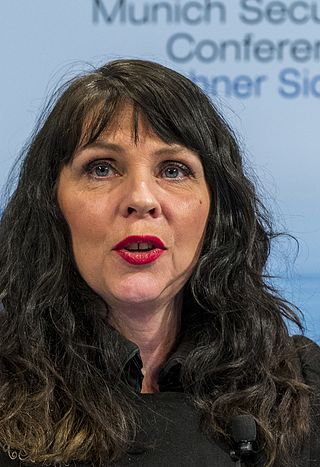Related Research Articles
The Windhoek Declaration for the Development of a Free, Independent and Pluralistic Press, the Windhoek Declaration for short, is a statement of press freedom principles by African newspaper journalists in 1991. The Declaration was produced at a UNESCO seminar, "Promoting an Independent and Pluralistic African Press," held in Windhoek, the capital of Namibia, from 29 April to 3 May 1991.
Artistic freedom can be defined as "the freedom to imagine, create and distribute diverse cultural expressions free of governmental censorship, political interference or the pressures of non-state actors." Generally, artistic freedom describes the extent of independence artists obtain to create art freely. Moreover, artistic freedom concerns "the rights of citizens to access artistic expressions and take part in cultural life—and thus [represents] one of the key issues for democracy." The extent of freedom indispensable to create art freely differs regarding the existence or nonexistence of national instruments established to protect, to promote, to control or to censor artists and their creative expressions. This is why universal, regional and national legal provisions have been installed to guarantee the right to freedom of expression in general and of artistic expression in particular. In 2013, Ms Farida Shaheed, United Nations special rapporteur to the Human Rights Council, presented her "Report in the field of cultural rights: The right to freedom of expression and creativity" providing a comprehensive study of the status quo of, and specifically the limitations and challenges to, artistic freedom worldwide. In this study, artistic freedom "was put forward as a basic human right that went beyond the 'right to create' or the 'right to participate in cultural life'." It stresses the range of fundamental freedoms indispensable for artistic expression and creativity, e.g. the freedoms of movement and association. "The State of Artistic Freedom" is an integral report published by arts censorship monitor Freemuse on an annual basis.

Freedom of information is freedom of a person or people to publish and consume information. Access to information is the ability for an individual to seek, receive and impart information effectively. This sometimes includes "scientific, indigenous, and traditional knowledge; freedom of information, building of open knowledge resources, including open Internet and open standards, and open access and availability of data; preservation of digital heritage; respect for cultural and linguistic diversity, such as fostering access to local content in accessible languages; quality education for all, including lifelong and e-learning; diffusion of new media and information literacy and skills, and social inclusion online, including addressing inequalities based on skills, education, gender, age, race, ethnicity, and accessibility by those with disabilities; and the development of connectivity and affordable ICTs, including mobile, the Internet, and broadband infrastructures".
The New World Information and Communication Order is a term coined in a debate over media representations of the developing world in UNESCO in the late 1970s early 1980s. The NWICO movement was part of a broader effort to formally tackle global economic inequality that was viewed as a legacy of imperialism upon the global south.
Liberty Institute is a Georgian research and advocacy organization affiliated with Ilia Chavchavadze State University. The Institute provides legal services in the field of civil and human rights, runs public campaigns, and conducts legal, educational, and legislative activities to promote democratic values, liberal values, public accountability, and control mechanisms to support the development of democratic institutions in Georgia.

International organizations have frequently alleged that Azerbaijan has violated human rights standards established in international law.
Source protection, sometimes also referred to as source confidentiality or in the U.S. as the reporter's privilege, is a right accorded to journalists under the laws of many countries, as well as under international law. It prohibits authorities, including the courts, from compelling a journalist to reveal the identity of an anonymous source for a story. The right is based on a recognition that without a strong guarantee of anonymity, many would be deterred from coming forward and sharing information of public interests with journalists.

The International Programme for the Development of Communication is a United Nations Educational, Scientific and Cultural Organization (UNESCO) programme aimed at strengthening the development of mass media in developing countries.

The condition of human rights in Moldova has come under scrutiny since 2002, and human rights organizations within Moldova and around the world have spoken out against what they feel to be unfair suppression of the independent media, as well as other abuses.
The mass media in Armenia refers to mass media outlets based in Armenia. Television, magazines, and newspapers are all operated by both state-owned and for-profit corporations which depend on advertising, subscription, and other sales-related revenues. Armenia's press freedoms improved considerably following the 2018 Velvet Revolution.

Freedom of speech is a principle that supports the freedom of an individual or a community to articulate their opinions and ideas without fear of retaliation, censorship, or legal sanction. The right to freedom of expression has been recognised as a human right in the Universal Declaration of Human Rights and international human rights law by the United Nations. Many countries have constitutional law that protects free speech. Terms like free speech, freedom of speech, and freedom of expression are used interchangeably in political discourse. However, in a legal sense, the freedom of expression includes any activity of seeking, receiving, and imparting information or ideas, regardless of the medium used.

Smári McCarthy is an Icelandic-Irish politician, innovator and information activist known for his work relating to direct democracy, transparency and privacy.

The International Modern Media Institute (IMMI) is an international institution with the aim of promoting debate about laws good for freedom of information, speech, and expression. The institute does this by offering advice and guidance in relation to legislation.

Birgitta Jónsdóttir is an Icelandic politician, anarchist, poet, and activist. She was a Member of the Althing (MP) for the Southwest Constituency from 2013 to 2017, representing the Pirate Party, having been elected at the 2013 election. She was previously an MP for Reykjavík Constituency South from 2009 to 2013. In November 2017, she has announced to retire from politics "for now".

Ramona Nicole Mănescu is a Romanian politician and lawyer. From 24 July 2019 to 4 November 2019, she served as minister of Foreign Affairs in the Romanian Government. She was a Member of the European Parliament serving 2007 to 2013 and 2014 to 2019 from the National Liberal Party, active within the European People's Party. As part of this group she is a member of the European Parliament Committee on Foreign Affairs, vice-chair in the Delegation for relations with the Mashreq countries and a substitute member in the Committee on transport and tourism and in Delegation for relations with the Arab Peninsula.

United Nations Security Council Resolution 1738, adopted unanimously on December 23, 2006, after reaffirming resolutions 1265 (1999), 1296 (2000), 1502 (2003) and 1674 (2006) on the protection of civilians in armed conflict, the Council condemned attacks against journalists in conflict situations. It was the last resolution adopted by the Security Council in 2006.
Most Azerbaijanis receive their information from mainstream television, which is unswervingly pro-government and under strict government control. According to a 2012 report of the NGO "Institute for Reporters’ Freedom and Safety (IRFS)" Azerbaijani citizens are unable to access objective and reliable news on human rights issues relevant to Azerbaijan and the population is under-informed about matters of public interest.

Media freedom in the European Union is a fundamental right that applies to all member states of the European Union and its citizens, as defined in the EU Charter of Fundamental Rights as well as the European Convention on Human Rights. Within the EU enlargement process, guaranteeing media freedom is named a "key indicator of a country's readiness to become part of the EU".

Safety of journalists is the ability for journalists and media professionals to receive, produce and share information without facing physical or moral threats.

Basic human rights in Italy includes freedom of belief and faith, the right of asylum from undemocratic countries, the right to work, and the right of dignity and equality before the law. Human rights are the basic rights of every citizen in every country. In Italy, human rights have developed over many years and Italy has education on human rights. In addition, Italy has specific human rights for women, children and LGBT people.
References
- ↑ "About IMMI". en.immi.is. Retrieved 2017-01-24.
The institute is founded first and foremost on the back of its namesake parliamentary resolution (Icelandic Modern Media Initiative) which was unanimously adopted in the Icelandic Parliament 16th of June 2010, with the aim of making Iceland a journalistic safe haven, protecting both freedom of expression as well as freedom of information.
- ↑ Gaedtke, Felix. "Can Iceland become the 'Switzerland of data'?". www.aljazeera.com. Retrieved 2017-01-26.